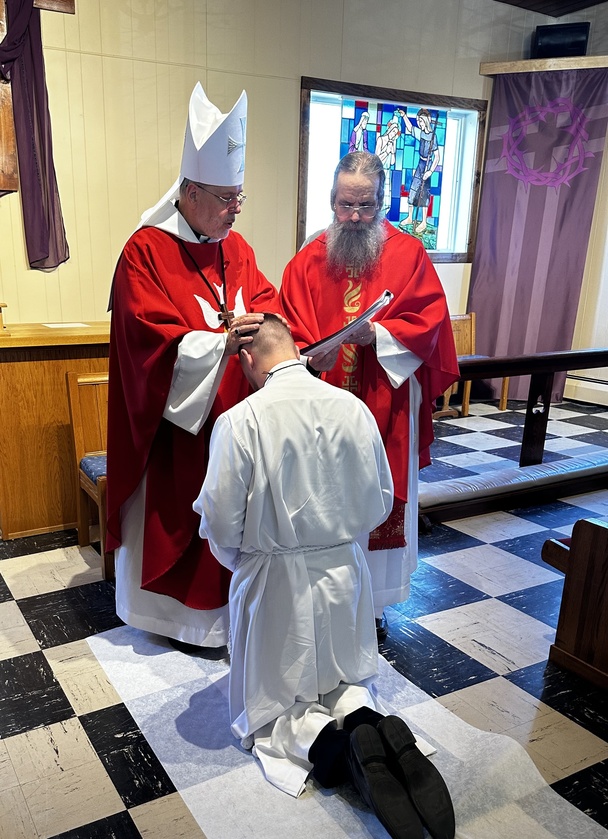
One of the areas I have grown in most over the past year or so has been in my recognition that Scripture, as a whole, centers and builds on the concept of liturgy. The liturgical functions of ancient Israel, and now the Church, is the means by which God governs, redeems, and lifts all of reality unto himself. Christ is of course at the center of this—the great incarnational reality of the liturgy, where man is lifted into God, made to participate in him. It is no accident that the Church is called “the Body of Christ.” The Church, by the power of God’s action in the liturgy, is quite literally made to be the incarnation of Christ on the earth; the means of salvation for the earth.
Liturgy makes the world go around—quite literally.
Much of my understanding of this Christocentric, liturgical way of reading Scripture has been influenced by the ancient fathers and in a modern context, Peter Leithart and James Jordan. Yesterday, I watched a video by Seraphim Hamilton (an Eastern Orthodox theologian) on this very subject, and to my delight, he has also picked up on a lot of liturgical undertones in Scripture through the work of Leithart, and more prominently, Jordan.
All this to say, as I have grown in my recognition of just how deeply liturgical Scripture is, I have recognized the failure of modern Protestant interpretations of books like the Revelation of Jesus Christ, recorded by St. John.
In a modern Evangelical view, you are really given four interpretative options.
First—and most common in America—you have the futurist view—most often associated with dispensationalism. This view, in its dispensational form, is foreign to orthodox Christian teaching and utterly self-absorbed by modern-day concerns foreign to Scripture. It is thoroughly disconnected from any and all historical-cultural context, and worse, misses the entire narrative thrust of the New Testament. It is an untenable position based on heterodox ideas.
That being said, the other three views, usually thought to be “the orthodox views” are often just as westernized and disconnected from Revelation. Preterism can turn into a backward form of “ancient newspaper exegesis”—something I believe Jordan himself says. Idealism can be so “pie in the sky” in its interpretation, that Revelation is completely disconnected from history. Historicism is, quite literally, newspaper exegesis down through the ages. All fail in their own way.
The key to understanding Revelation, as I have come to understand, is through its liturgical drama. Revelation is a book about liturgy, and the victory of the Lamb and his Church through the divine liturgy.
All that being said, preterism and idealism, when paired with this larger theme of liturgy, pull the whole narrative together.
What preterism does well is that it takes seriously John’s words to the seven churches that the events contained will take place “soon” and that “the time is near.” All other views, most notably the futurist, have to completely change the plain meaning of these timestamps in order to make sense of their interpretation. However, these words are important because they set up the reality that the first-century recipients of the book were ACTUALLY the recipients of the book. What idealism does well is that it recognizes the cyclical nature of redemptive history. It recognizes that worlds will come and go. It sees plainly the repetition of God’s process of bringing all things in subjection to his Christ.
However, even with Preterism helping GROUND the events of Revelation in the first century and Idealism helping demonstrate the cyclical nature of these symbols, without liturgy—without a sacramental worldview—the meaning of Revelation will be lost. It is meant to be read and understood as a liturgical narrative, not simply an account of the fall of Rome or Jerusalem—or worse, a narrative about “the end times.”
Revelation depicts the heavenly divine liturgy of the Church, through which the world is governed; beasts are subdued, and the world reaches its eschatological telos, finding its yes and amen in the Lamb of God on the eternal Altar of heaven, offered up for the sins of the world.
If you lack a sacramental worldview, you will miss the entire point of Revelation. Of that, I am sure.
This is the first video reflection for the Great Fast.
Welcome to the Mere Catholicity Locals Community! Here, you will find like-minded Christians with a desire to live ecumenically and pursue Christ in all things.
The Mere Catholicity movement runs only through listener support. The work that I (Jonah) do requires time and money. Without the financial support of my Locals community, I would not be able to continue making content. Simple as that. It is only thanks to this group that I can continue providing you with content that (hopefully) both edifies and challenges!
The good news for you is that joining the community itself is completely FREE! Once you sign up, you will be able to see most posts, live streams, and even content posted by other users. However, you will only be able to observe. You will not be able to comment, post, or see any exclusive content. This might be a good way to see if you want to support later down the line. So please join! Even if you cannot afford to give at this time!
Now, for those who do wish to give ...
Friends - as I consider the various platforms that I operate, I find Substack to the most conducive to the model of online ministry that I am aiming for. Though I still plan to post here, as many of you still support me through this platform, Substack is where I will be focusing the majority of my time. If some of you wish to move your subscription from here to Substack, you are welcome to do that. Those who continue to support here, I will continue to post here — mostly the stuff that is behind the paywall on Substack so that you are getting the exclusive content regardless of where you are subscribed.
Hope you all are doing well. Lord bless you.
- Rev. Jonah
I've been gone again for a time preparing for my ordination. I was ordained a Deacon in the Holy Catholic Church on March 8th, 2025.
It was a joy beyond words. I am now back in full swing with ministry, media, and work.
I hope you all have been doing well. More to come soon.

Good morning everyone. I wanted to quickly update you on the Mere Catholicity Podcast. I’ve been posting videos on my channel, but it has been quite sometime since my channel has had a podcast episode release.
With my new job as a classical teacher, scheduling interviews has been a challenge. However, my plan is to use my summer breaks as time to double down on planning and recording new podcasts. The idea will be to record a ton of interviews that will then slowly release throughout the school year, expiring around the time the following summer arrives. This will ultimately result in a consistent once a month interview.
All that to say, the podcast will resume here in May or June of 2025 with some excellent interviews lined up!
Blessings on your Sunday!












